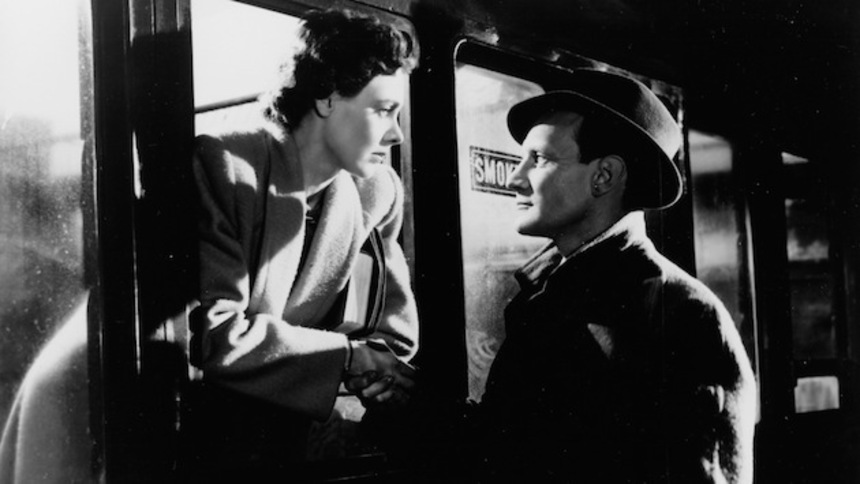Blu-ray Review: David Lean's BRIEF ENCOUNTER Is A Sparkling Affair

Made in 1945 immediately prior to his Charles Dickens double-whammy of Great Expectations and Oliver Twist, David Lean's Brief Encounter remains a handsome bastion of romance on film - a kind of British Casablanca, albeit on a much smaller scale.
Returning to the Criterion Collection on blu-ray this month as a stand-alone spine number (#76, though it was also recently included in their box set of "David Lean Directs Noel Coward"), the 2008 restoration of Brief Encounter is for all intents and purposes pristine. There's almost no deterioration of the image at all, and the mono soundtrack rings true as a bell. It's easy to slip into the film's period fantasia, at least from a presentation standpoint. The mindset might require a bit more work.
Brief Encounter, of course, turns on what is, by today's standards, an extremely low-impact romantic dilemma. A bored housewife, Laura, goes to town every Thursday like clockwork, to window-shop and go to the movies. We glean immediately that Laura is comfortably middle-class and, with class bearing so much weight in British society, therefore a "proper" sort of person.
She meets a married man, Alec, while waiting for the train home one night, and over the course of a handful of subsequent Thursday afternoon excursions, they fall in love. (The plausibility of this overwhelming attraction may vary with the viewer - I didn't find Trevor Howard's Alec a particularly charismatic would-be lover.)
And that's it. There is something genuinely poignant about a story whose drama turns on nothing more than its heroine's decision of whether she will go through with an affair; the average episode of Better Call Saul has more overt moral transgressions per hour than Brief Encounter.
(I also realize, in writing this, that using sex as the stamp of legitimacy for an affair might be a fairly cheap, modern idea, and that for Laura at least, the damage is done as soon as she's fallen in love with a man outside her marriage.)
This, however, truly is the film's strength. It was refreshingly absorbing and affecting to laser in on a question as personal as one's faithfulness to marriage, without the operatic sensationalism, or me-first narrative, that seems to have overtaken the way media cover extramarital affairs in the years since. Laura's dilemma isn't built around the rules of society or how she will look as a person, or even sexist ideas around female pleasure; it's a true grappling with how this unexpected chain of events is making her feel about herself as a person, and the outcomes of that guilt and confusion.
The delicate morality of Laura's guilt, and the impact it has on her, is finely rendered by Lean and lead actress Celia Johnson. Notably (again, at least by today's standards), Laura is a slightly older woman, well settled into the routine of her somewhat pedestrian life. As her relationship with Alec progresses, Johnson ages visibly through the use of carefully applied makeup, as though the brief, white-hot happiness of her time with Alec is burning through her soul in the off-hours, every time she has to go home to a husband she still cherishes and respects, but is no longer in love with.
Lean stages all of this with all-but-invisible artifice - a roaring train here, a swath of passion-drenched rain there, but otherwise sinking into the background and letting the drama itself take the lead... at least until the film's single stylistic showpiece. Laura, believing she has lost Alec forever, briefly retreats into herself in the tea shop adjacent to the train platform, and as Lean pushes in for a close-up, the camera cants to an almost F.W. Murnau degree. The move creates a heady, palpable sense of gravity shifting around Laura, as though she will now fall out of the new "bottom" of the frame - which of course she does, as a series of similarly-canted shots show her falling, almost against her will, towards the train tracks beyond, and the potential oncoming doom of the locomotive.
Fans of Carol will also note that last year's period romance borrowed its powerful narrative structure, if not quite its sense of tragedy, from Brief Encounter. Noel Coward's script opens and closes on the same scene, of Laura and Alec's last encounter at the tea shop, where they are interrupted by a nosey acquaintance.
Of course, without the contextual weight of the affair (told by Laura in voiceover, ostensibly to her husband, but really only to herself), the first version of the scene seems trivial and unimportant, Laura and Alec's convincing social lies covering the heartbreak bubbling within both of them. When we return to the moment 80 minutes later, the same sequence is a maelstrom of grief and loss - a marvelous cinematic experience.
Supplements on the disc are useful, if a bit dry: a 16-minute interview with Noel Coward scholar Barry Day is less intriguing for its content than for Day's astonishingly fluffy sideburns; a one-hour documentary on Lean's career called David Lean: A Self-Portrait is informative, but feels (necessarily?) self-aggrandizing; and a commentary track and short making-of.
Brief Encounter will be released on blu-ray as part of the Criterion Collection on April 26.






